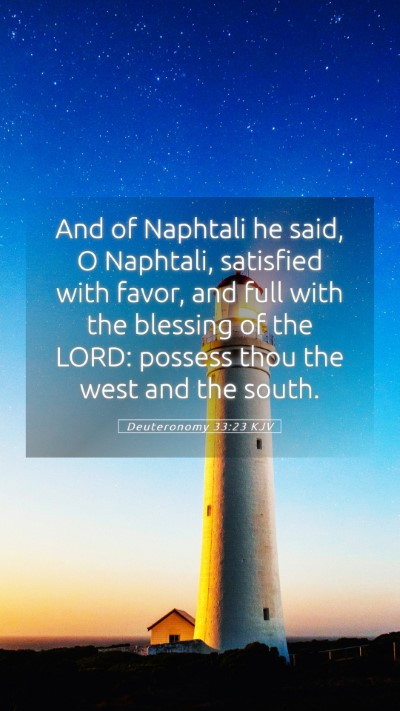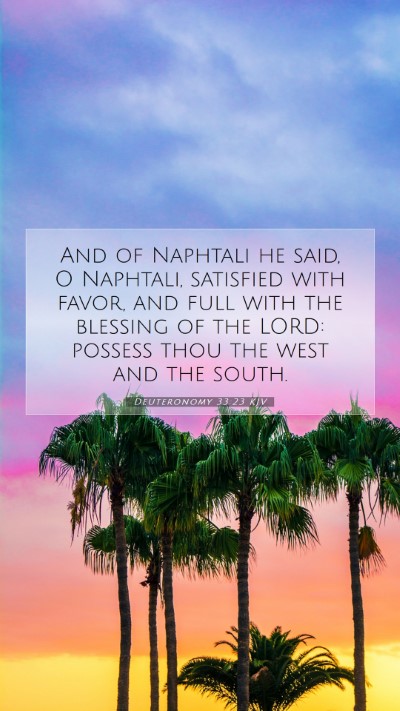Deuteronomy 33:23 - Bible Verse Meaning and Interpretation
Deuteronomy 33:23 states: "And of Naphtali he said, O Naphtali, satisfied with favour, and full with the blessing of the Lord: possess thou the west and the south."
This verse is part of Moses' blessing to the tribes of Israel before his death, highlighting God's favor and intentions for each tribe. In analyzing this passage, we draw insights from respected public domain commentaries, including those by Matthew Henry, Albert Barnes, and Adam Clarke.
Understanding the Context
The immediate context of Deuteronomy 33 is the farewell address of Moses. It's imperative to understand that these blessings occur as Israel prepares to enter the Promised Land, a significant transition from their wilderness wanderings. Each tribe receives a tailored blessing based on their unique characteristics and roles within the community of Israel.
Verse Analysis by Commentators
-
Matthew Henry:
Henry notes that Naphtali is depicted as "satisfied with favor," suggesting a deep sense of contentment that comes from divine providence. The blessing indicates that the tribe of Naphtali would experience abundant blessings, which Henry considers indicative of spiritual favor and the material prosperity that accompanies it. Moreover, Naphtali's geographical inheritance in the northwest part of Canaan would allow them to enjoy rich pastures and lakes, reflecting the blessings of the Lord in practical terms.
-
Albert Barnes:
Barnes emphasizes the wording of "full with the blessing of the Lord," conveying an image of completion and abundance. He explicates that the term "satisfied" illustrates a profound state of spiritual fulfillment and earthly prosperity for Naphtali. The dual mention of "west and south" signifies the extensive territory allotted, reinforcing the idea of God's generosity. Barnes suggests that this acknowledgement serves as a reminder of divine favor that permeates through obedience and faithfulness.
-
Adam Clarke:
Clarke focuses on the heritage and role of Naphtali among the tribes, pointing out that they are blessed with both spiritual and physical prosperity. His commentary connects the tribal blessings to a larger theological framework, viewing them as signs of covenant faithfulness. Clarke elaborates on the geographical aspect, linking Naphtali’s inheritance to its pivotal role in biblical history, notably in the ministry of Christ, who made Capernaum within Naphtali’s territory the center of His ministry.
Thematic Insights
The overall theme in Deuteronomy 33:23 revolves around divine blessing, satisfaction, and territorial inheritance. The richness of this verse communicates several theological principles:
- Divine Favor: The mention of being "satisfied" symbolizes God's grace upon Naphtali, a reminder of how believers can find fulfillment in God’s blessings.
- Abundance: The fullness of blessings can reflect both physical sustenance and spiritual contentment in believers' lives.
- Geographical Promise: The specific mention of "west and south" shows God's meticulous planning and provision in the lives of His people.
Application for Today
For modern readers, Deuteronomy 33:23 can serve as a potent reminder of God's promises and blessings in our own lives. The notions of being satisfied by God's favor are incredibly relevant, urging believers to recognize and appreciate the blessings they have received, both spiritually and materially. Engaging with this passage can stimulate discussion in Bible study groups as participants explore themes of contentment, divine favor, and the nature of God's blessings.
Related Cross-References
- Genesis 49:21: Jacob’s blessing to Naphtali, linking the tribes across biblical narratives.
- Isaiah 9:1-2: The prophecy regarding Galilee, associated with Naphtali and the advent of Christ.
- Matthew 4:13-16: Jesus’ ministry in the territory of Naphtali fulfilling Old Testament prophecy.
Conclusion
Deuteronomy 33:23 serves not just as a historical account of tribal blessings, but as a conduit for spiritual reflection on God's enduring favor and the joy that comes from recognizing His providence in our lives. Through understanding this verse, believers can apply its lessons and rejoice in the abundance of God's blessings, grounding their faith in both past promises and future hopes.


